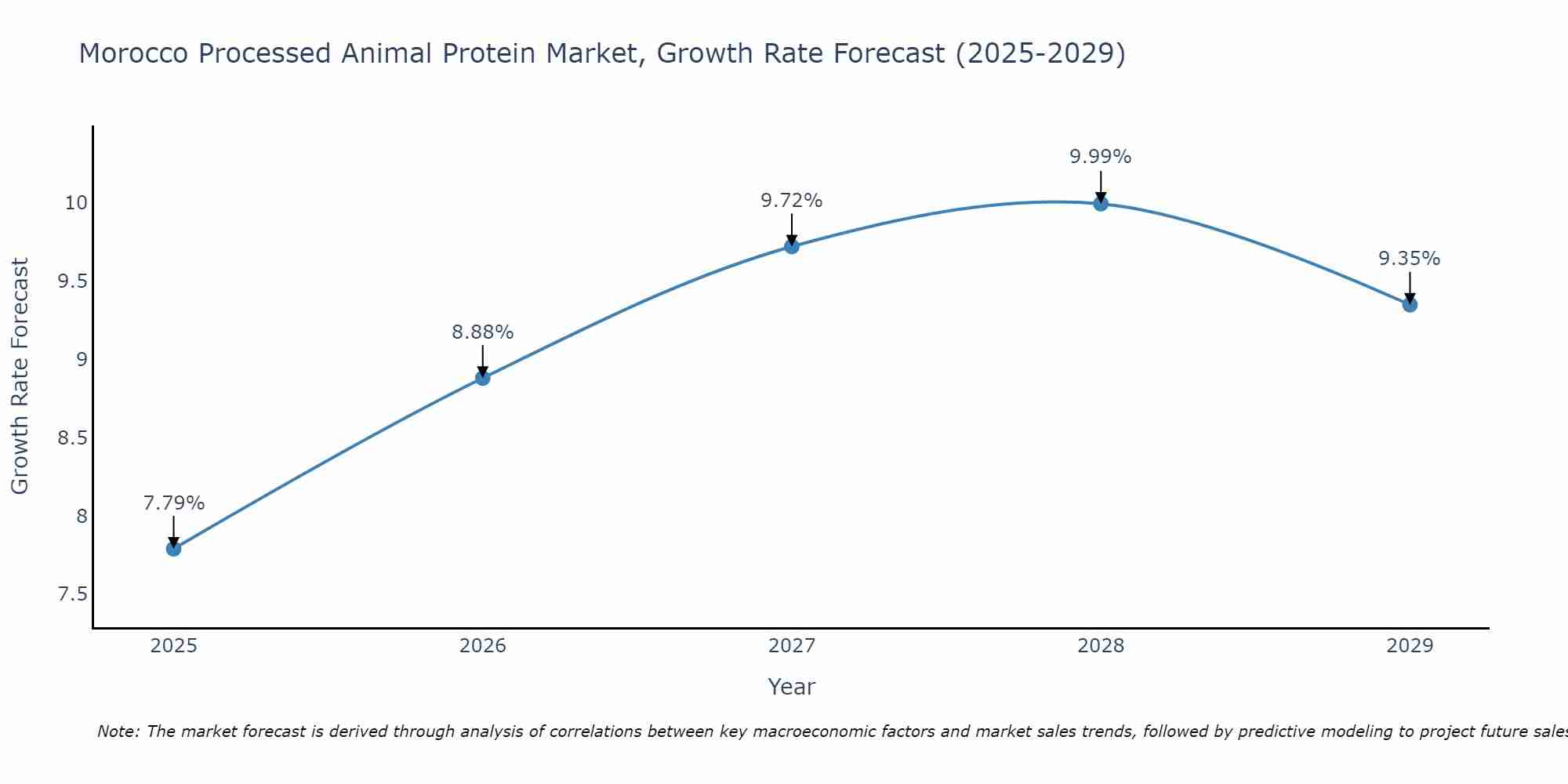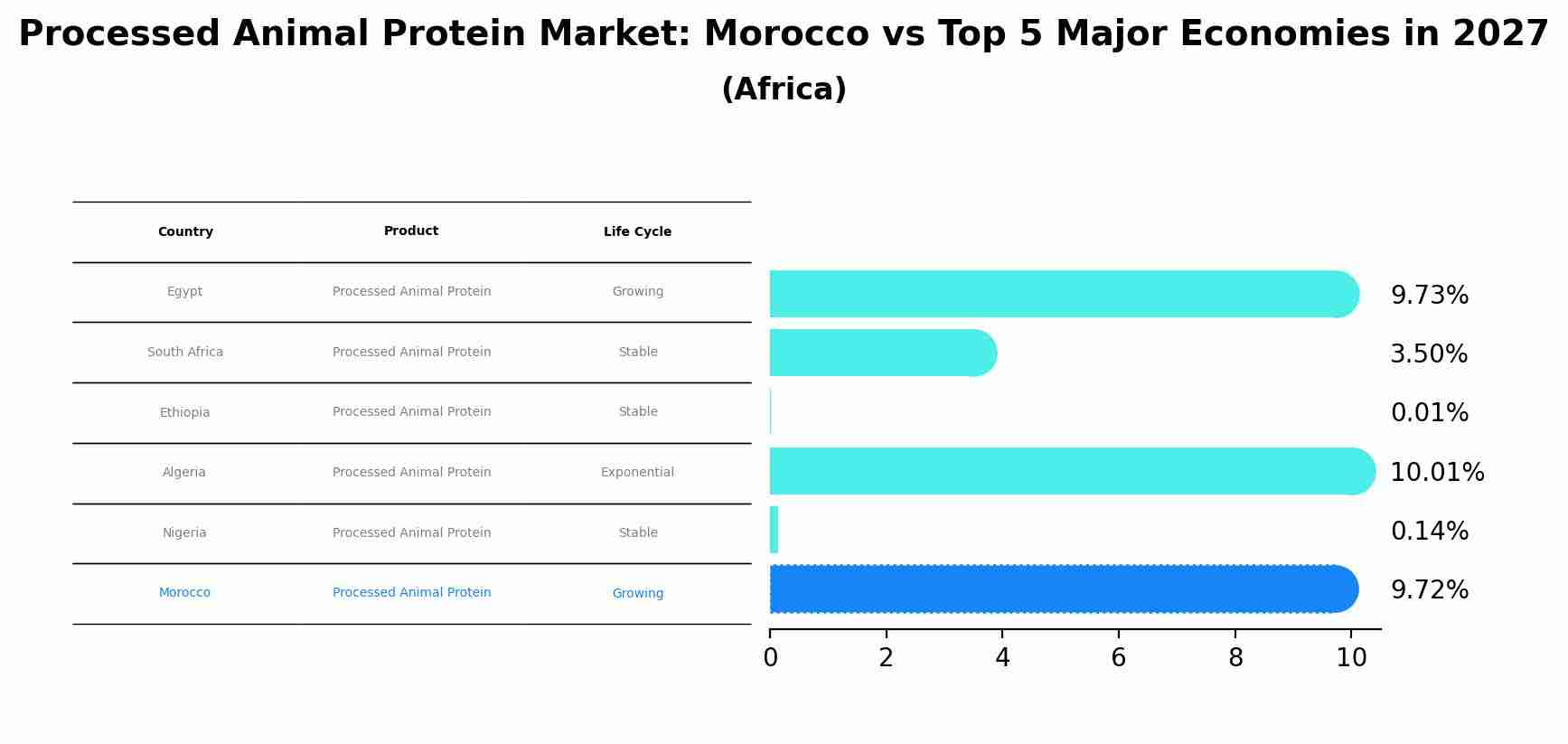Morocco Processed Animal Protein Market (2025-2031) Outlook | Value, Trends, Forecast, Growth, Analysis, Industry, Share, Companies, Size & Revenue
| Product Code: ETC411949 | Publication Date: Oct 2022 | Updated Date: Jul 2025 | Product Type: Market Research Report | |
| Publisher: 6Wresearch | Author: Shubham Deep | No. of Pages: 75 | No. of Figures: 35 | No. of Tables: 20 |
Morocco Processed Animal Protein Market Size Growth Rate
The Morocco Processed Animal Protein Market is projected to witness mixed growth rate patterns during 2025 to 2029. Starting at 7.79% in 2025, the market peaks at 9.99% in 2028, and settles at 9.35% by 2029.

Processed Animal Protein Market: Morocco vs Top 5 Major Economies in 2027 (Africa)
Morocco's Processed Animal Protein market is anticipated to experience a growing growth rate of 9.72% by 2027, reflecting trends observed in the largest economy Egypt, followed by South Africa, Ethiopia, Algeria and Nigeria.

Morocco Processed Animal Protein Market Synopsis
The Morocco processed animal protein market is characterized by a growing demand for animal feed additives due to the increasing livestock production in the country. The market is driven by factors such as rising meat consumption, a focus on improving feed efficiency, and the need to enhance animal health and growth. Key players in the market offer a variety of processed animal proteins such as meat meal, bone meal, and feather meal to cater to the diverse needs of livestock farmers. The regulatory environment plays a crucial role in shaping the market dynamics, with stringent quality and safety standards influencing product offerings and market strategies. Overall, the Morocco processed animal protein market is poised for steady growth, driven by the expansion of the livestock sector and the increasing awareness about the benefits of using animal feed additives.
Morocco Processed Animal Protein Market Trends
In the Morocco Processed Animal Protein Market, a notable trend is the increasing demand for high-quality and sustainable animal protein products. Consumers are becoming more conscious of the sourcing and production methods of processed animal protein, leading to a growing preference for organic and ethically sourced products. Additionally, there is a rising interest in alternative protein sources such as plant-based proteins, driving innovation in the market to cater to changing consumer preferences. Government initiatives promoting self-sufficiency in food production and stricter regulations on food safety and quality are also influencing the market dynamics. Overall, the Morocco Processed Animal Protein Market is experiencing a shift towards healthier, more sustainable, and diverse product offerings to meet the evolving demands of consumers.
Morocco Processed Animal Protein Market Challenges
In the Morocco processed animal protein market, some key challenges include regulatory constraints on imports, fluctuating prices of raw materials, inadequate infrastructure for processing and distribution, and limited consumer awareness about the benefits of processed animal protein products. The market also faces competition from alternative protein sources such as plant-based products, which are gaining popularity among health-conscious consumers. Additionally, concerns about animal welfare and sustainability are impacting consumer perceptions of processed animal protein. To navigate these challenges and drive growth in the market, companies need to invest in research and development to create innovative products, establish strong distribution networks, and educate consumers about the nutritional value and safety of processed animal protein.
Morocco Processed Animal Protein Market Investment Opportunities
In the Morocco Processed Animal Protein Market, there are several investment opportunities worth considering. The increasing demand for processed animal protein products such as meat snacks, sausages, and ready-to-eat meals presents a promising market for investors. Additionally, the growing awareness of the benefits of protein-rich diets among consumers further boosts the market potential. Investing in modern processing technologies and facilities to enhance production efficiency and product quality can be a profitable venture. Furthermore, exploring opportunities for product innovation and diversification to cater to changing consumer preferences and dietary trends can help investors stay competitive in the market. Overall, the Morocco Processed Animal Protein Market offers a fertile ground for investment with the potential for growth and expansion.
Jordan Agar Market Government Policies
The Moroccan government has implemented several key policies related to the processed animal protein market to ensure food safety and quality standards. These policies include strict regulations on the production, processing, and labeling of animal protein products to protect consumers from health risks and fraudulent practices. Additionally, the government has established inspection mechanisms and quality control measures to monitor and enforce compliance with these regulations. Furthermore, there are subsidies and incentives provided to promote the development and growth of the processed animal protein industry in Morocco, encouraging investment and innovation in this sector. Overall, these government policies aim to safeguard public health, enhance market transparency, and support the sustainable growth of the processed animal protein market in Morocco.
Morocco Processed Animal Protein Market Future Outlook
The Morocco processed animal protein market is expected to witness steady growth in the coming years, driven by factors such as increasing demand for animal feed, growth in the livestock industry, and rising consumer awareness about the benefits of protein-rich diets for animals. The market is also likely to benefit from technological advancements in processing techniques and the growing trend of incorporating high-quality protein sources in animal feed formulations. However, challenges such as fluctuating raw material prices, stringent regulations, and competition from alternative protein sources may impact market growth. Overall, with the increasing focus on animal nutrition and the growing need for sustainable protein sources, the Morocco processed animal protein market is poised for expansion in the foreseeable future.
Key Highlights of the Report:
- Morocco Processed Animal Protein Market Outlook
- Market Size of Morocco Processed Animal Protein Market, 2024
- Forecast of Morocco Processed Animal Protein Market, 2031
- Historical Data and Forecast of Morocco Processed Animal Protein Revenues & Volume for the Period 2021 - 2031
- Morocco Processed Animal Protein Market Trend Evolution
- Morocco Processed Animal Protein Market Drivers and Challenges
- Morocco Processed Animal Protein Price Trends
- Morocco Processed Animal Protein Porter's Five Forces
- Morocco Processed Animal Protein Industry Life Cycle
- Historical Data and Forecast of Morocco Processed Animal Protein Market Revenues & Volume By Source for the Period 2021 - 2031
- Historical Data and Forecast of Morocco Processed Animal Protein Market Revenues & Volume By Poultry for the Period 2021 - 2031
- Historical Data and Forecast of Morocco Processed Animal Protein Market Revenues & Volume By Pork for the Period 2021 - 2031
- Historical Data and Forecast of Morocco Processed Animal Protein Market Revenues & Volume By Beef for the Period 2021 - 2031
- Historical Data and Forecast of Morocco Processed Animal Protein Market Revenues & Volume By Others for the Period 2021 - 2031
- Historical Data and Forecast of Morocco Processed Animal Protein Market Revenues & Volume By Form for the Period 2021 - 2031
- Historical Data and Forecast of Morocco Processed Animal Protein Market Revenues & Volume By Dry for the Period 2021 - 2031
- Historical Data and Forecast of Morocco Processed Animal Protein Market Revenues & Volume By Liquid for the Period 2021 - 2031
- Morocco Processed Animal Protein Import Export Trade Statistics
- Market Opportunity Assessment By Source
- Market Opportunity Assessment By Form
- Morocco Processed Animal Protein Top Companies Market Share
- Morocco Processed Animal Protein Competitive Benchmarking By Technical and Operational Parameters
- Morocco Processed Animal Protein Company Profiles
- Morocco Processed Animal Protein Key Strategic Recommendations
Frequently Asked Questions About the Market Study (FAQs):
- Single User License$ 1,995
- Department License$ 2,400
- Site License$ 3,120
- Global License$ 3,795
Search
Related Reports
- Vietnam System Integrator Market (2025-2031) | Size, Companies, Analysis, Industry, Value, Forecast, Growth, Trends, Revenue & Share
- ASEAN and Thailand Brain Health Supplements Market (2025-2031) | Strategy, Consumer Insights, Analysis, Investment Trends, Opportunities, Growth, Size, Share, Industry, Revenue, Segments, Value, Segmentation, Supply, Forecast, Restraints, Outlook, Competition, Drivers, Trends, Demand, Pricing Analysis, Competitive, Strategic Insights, Companies, Challenges
- ASEAN Bearings Market (2025-2031) | Strategy, Consumer Insights, Analysis, Investment Trends, Opportunities, Growth, Size, Share, Industry, Revenue, Segments, Value, Segmentation, Supply, Forecast, Restraints, Outlook, Competition, Drivers, Trends, Demand, Pricing Analysis, Competitive, Strategic Insights, Companies, Challenges
- Europe Flooring Market (2025-2031) | Outlook, Share, Industry, Trends, Forecast, Companies, Revenue, Size, Analysis, Growth & Value
- Saudi Arabia Manlift Market (2025-2031) | Outlook, Size, Growth, Trends, Companies, Industry, Revenue, Value, Share, Forecast & Analysis
- Uganda Excavator, Crane, and Wheel Loaders Market (2025-2031) | Strategy, Consumer Insights, Analysis, Investment Trends, Opportunities, Growth, Size, Share, Industry, Revenue, Segments, Value, Segmentation, Supply, Forecast, Restraints, Outlook, Competition, Drivers, Trends, Demand, Pricing Analysis, Competitive, Strategic Insights, Companies, Challenges
- Rwanda Excavator, Crane, and Wheel Loaders Market (2025-2031) | Strategy, Consumer Insights, Analysis, Investment Trends, Opportunities, Growth, Size, Share, Industry, Revenue, Segments, Value, Segmentation, Supply, Forecast, Restraints, Outlook, Competition, Drivers, Trends, Demand, Pricing Analysis, Competitive, Strategic Insights, Companies, Challenges
- Kenya Excavator, Crane, and Wheel Loaders Market (2025-2031) | Strategy, Consumer Insights, Analysis, Investment Trends, Opportunities, Growth, Size, Share, Industry, Revenue, Segments, Value, Segmentation, Supply, Forecast, Restraints, Outlook, Competition, Drivers, Trends, Demand, Pricing Analysis, Competitive, Strategic Insights, Companies, Challenges
- Angola Excavator, Crane, and Wheel Loaders Market (2025-2031) | Strategy, Consumer Insights, Analysis, Investment Trends, Opportunities, Growth, Size, Share, Industry, Revenue, Segments, Value, Segmentation, Supply, Forecast, Restraints, Outlook, Competition, Drivers, Trends, Demand, Pricing Analysis, Competitive, Strategic Insights, Companies, Challenges
- Israel Intelligent Transport System Market (2025-2031) | Strategy, Consumer Insights, Analysis, Investment Trends, Opportunities, Growth, Size, Share, Industry, Revenue, Segments, Value, Segmentation, Supply, Forecast, Restraints, Outlook, Competition, Drivers, Trends, Demand, Pricing Analysis, Competitive, Strategic Insights, Companies, Challenges
Industry Events and Analyst Meet
Our Clients
Whitepaper
- Middle East & Africa Commercial Security Market Click here to view more.
- Middle East & Africa Fire Safety Systems & Equipment Market Click here to view more.
- GCC Drone Market Click here to view more.
- Middle East Lighting Fixture Market Click here to view more.
- GCC Physical & Perimeter Security Market Click here to view more.
6WResearch In News
- Doha a strategic location for EV manufacturing hub: IPA Qatar
- Demand for luxury TVs surging in the GCC, says Samsung
- Empowering Growth: The Thriving Journey of Bangladesh’s Cable Industry
- Demand for luxury TVs surging in the GCC, says Samsung
- Video call with a traditional healer? Once unthinkable, it’s now common in South Africa
- Intelligent Buildings To Smooth GCC’s Path To Net Zero













